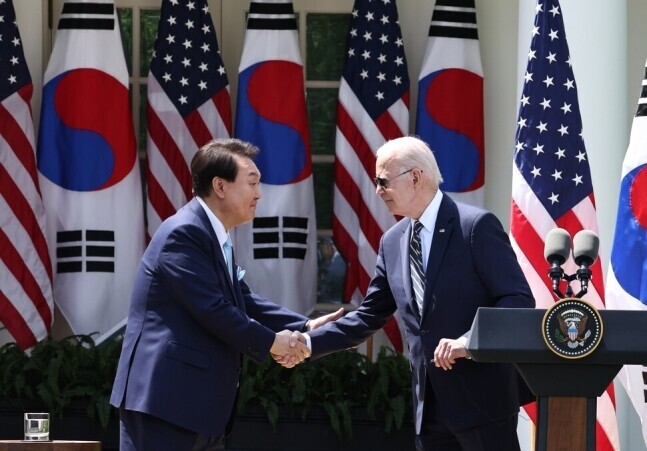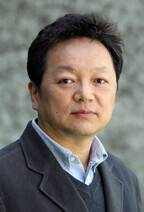hankyoreh
Links to other country sites 다른 나라 사이트 링크
[Column] The Washington Declaration is the product of mutual distrust between S. Korea and US


South Korean President Yoon Suk-yeol said during an address at the Harvard Kennedy School on Friday that Korea and the US’ mutual defense treaty was based on conventional weapons in 1953, but the Washington Declaration has upgraded it to include nuclear capabilities.
Yoon reiterated in a Cabinet meeting on Tuesday that the alliance has been “upgraded to a new nuclear-based paradigm,” while Defense Minister Lee Jong-sup and others touted the Washington Declaration as the “Korea-US Mutual Defense Treaty 2.0.”
But the claims they’re peddling are misleading, or even false.
The Washington Declaration is not the Korea-US Mutual Defense Treaty 2.0. The declaration has no legal binding, whereas a mutual defense treaty is international law with the force of domestic law in both Korea and the US. As such, conflating the two is no more than political rhetoric — and that’s speaking politely.
Furthermore, the Korea-US alliance has long included the nuclear deterrent represented by the US’ pledge of “extended deterrence.” Looking back to Korea-US summits held in May 2022 and 2021, the joint statements reiterated that “President Biden affirms the US extended deterrence commitment” to South Korea.
Notwithstanding the official story offered by Korea and the US, the Washington Declaration was motivated not by “trust among allies” but by “distrust among allies.”
The Yoon administration’s doubts about the US and its commitment to extended deterrence were evident in Yoon’s remarks following a work briefing by the Ministry of Foreign Affairs and the Ministry of National Defense on Jan. 11, when he said that Korea was “capable of acquiring its own nuclear arsenal.”
According to the Korean government, the main points of the Washington Declaration are the establishment of the Nuclear Consultative Group and the visit of US nuclear ballistic missile submarines to South Korea.
Prior to Yoon’s summit with President Joe Biden, the Korean government had raised expectations about “nuclear sharing.” But not only does the Washington Declaration not provide nuclear sharing, but it’s qualitatively little different from the standard concept of “extended deterrence.”
In exchange, Yoon pledged to abide by the duties of the Nuclear Non-Proliferation Treaty (NPT) and the Korea-US nuclear energy agreement — which amounts to abandoning the idea of independent nuclear armament — and to limit nuclear energy to peaceful applications. Complying with the NPT is something Korea has already promised the international community and thus doesn’t need to reaffirm.
In short, the Washington Declaration is a redundant declaration produced by mutual distrust in the South Korea-US alliance.
“This speaks to the deep distrust between the two countries, which feel obliged to put the obvious into writing,” said a senior figure who has long been closely involved in the maintenance of the alliance.
Presumably, the less trusting side made the first move. It’s highly suggestive that “the Americans came up with the idea of creating a separate document [that is, the Washington Declaration],” as Cho Tae-yong, director of the National Security Office, said Monday.
That’s why multiple former government officials have observed that the unspoken truth of the Washington Declaration is that Biden got Yoon to commit to rejecting the idea of nuclear armament.
Please direct questions or comments to [english@hani.co.kr]

Editorial・opinion
![[Column] Season 2 of special prosecutor probe may be coming to Korea soon [Column] Season 2 of special prosecutor probe may be coming to Korea soon](https://flexible.img.hani.co.kr/flexible/normal/500/300/imgdb/original/2024/0426/3317141030699447.jpg) [Column] Season 2 of special prosecutor probe may be coming to Korea soon
[Column] Season 2 of special prosecutor probe may be coming to Korea soon![[Column] Park Geun-hye déjà vu in Yoon Suk-yeol [Column] Park Geun-hye déjà vu in Yoon Suk-yeol](https://flexible.img.hani.co.kr/flexible/normal/500/300/imgdb/original/2024/0424/651713945113788.jpg) [Column] Park Geun-hye déjà vu in Yoon Suk-yeol
[Column] Park Geun-hye déjà vu in Yoon Suk-yeol- [Editorial] New weight of N. Korea’s nuclear threats makes dialogue all the more urgent
- [Guest essay] The real reason Korea’s new right wants to dub Rhee a founding father
- [Column] ‘Choson’: Is it time we start referring to N. Korea in its own terms?
- [Editorial] Japan’s rewriting of history with Korea has gone too far
- [Column] The president’s questionable capacity for dialogue
- [Column] Are chaebol firms just pizza pies for families to divvy up as they please?
- [Column] Has Korea, too, crossed the Rubicon on China?
- [Correspondent’s column] In Japan’s alliance with US, echoes of its past alliances with UK
Most viewed articles
- 1Samsung subcontractor worker commits suicide from work stress
- 2‘We must say no’: Seoul defense chief on Korean, USFK involvement in hypothetical Taiwan crisis
- 3[Editorial] Korea’s surprise Q1 growth requires objective assessment, not blind fanfare
- 4Division commander ordered troops to enter raging flood waters before Marine died, survivor says
- 5Is Japan about to snatch control of Line messenger from Korea’s Naver?
- 6No good, very bad game for Korea puts it out of Olympics for first time since 1988
- 7US overtakes China as Korea’s top export market, prompting trade sanction jitters
- 8N. Korean delegation’s trip to Iran shows how Pyongyang is leveraging ties with Moscow
- 9Korea’s 1.3% growth in Q1 signals ‘textbook’ return to growth, says government
- 10[Column] Season 2 of special prosecutor probe may be coming to Korea soon